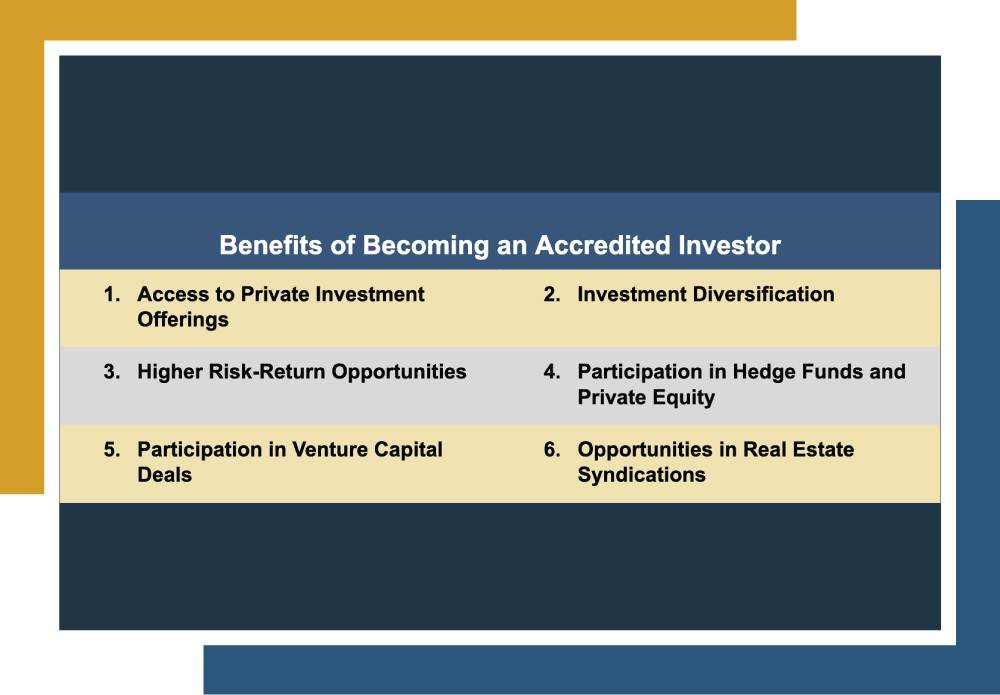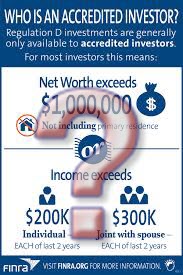All Categories
Featured
Table of Contents
A specific have to have a total assets over $1 million, excluding the main residence (separately or with partner or companion), to certify as a certified financier. Showing adequate education or task experience, being a registered broker or investment expert, or having certain professional certifications can additionally certify a specific as an approved capitalist.
Certified capitalists have accessibility to investments not registered with the SEC and can include a "spousal matching" when establishing credentials. Recognized capitalists may face prospective losses from riskier investments and have to confirm monetary class to join uncontrolled investments (sophisticated investor rule canada). Approved capitalist standing matters because it determines eligibility for financial investment chances not available to the general public, such as exclusive positionings, endeavor capital, bush funds, and angel financial investments
Accredited Investor Requirements Usa

To get involved, accredited capitalists should come close to the provider of unregistered safety and securities, that may require them to complete a set of questions and offer monetary documents, such as tax obligation returns, W-2 types, and account declarations, to confirm their condition. Regulations for accredited capitalists are looked after by the U.S. Securities and Exchange Compensation (SEC), making certain that they fulfill certain economic and specialist criteria.
This expansion of the recognized financier swimming pool is planned to keep investor defense while providing greater access to unregistered investments for those with the required economic refinement and risk resistance. - accredited investor leads
Investor Accreditation Form
Real estate syndication is rather similar to REITs since it also includes merging sources to buy real estate investments. A syndication bargain is when multiple financiers pool their resources together to acquire a solitary realty residential property. This offer is assembled by a syndicator, also known as the general enroller.
These investors will provide many of the capital required to acquire the home (investors qualification). If you think in the actual estate residential property being syndicated, you can sign up with as one of the passive financiers.
These residential or commercial properties create regular cash flow through month-to-month rental earnings. In addition, these large homes are typically more challenging to get as a single investor, which is why submission is an excellent configuration. Capitalists can join multifamily realty spending with a much reduced minimum financial investment. The syndicator will certainly additionally be in charge of residential or commercial property management, implying easy investors do not have to bother with coming to be a property manager.
Recognized capitalists do not have to collect rental earnings, deal with renters, deal with emergency situations, spend cash on repair services, etc. Either the syndicator will employ a third celebration home manager to do this or they will handle it themselves.
This indicates financiers get easy income from rental fees, and the eventual structure sales. This is based on what percent of the residential or commercial property they have, depending on the deal structure.
Definition Of Accredited Investor Regulation D

Paid non-client promotion: Associate links for the items on this web page are from companions that compensate us (see our marketer disclosure with our checklist of partners for more information). Nonetheless, our opinions are our very own. See just how we rate investing items to compose impartial item reviews. A recognized capitalist is an individual or establishment that can invest in unregulated safety and securities.
Unregistered safeties are naturally risky yet frequently provide higher rates of return. If you've ever come throughout an investment readily available only to supposed recognized capitalists, you have actually most likely questioned what the term suggested. The tag can relate to entities varying from enormous banking institutions and rich Lot of money 500 firms, all the way to high-earning families and also people.
Offering to certified capitalists is just one of those exemptions, covered by SEC Rule 501 under Guideline D of the Securities Act of 1933. The rule was composed as a government feedback to the Great Depression, giving market accessibility to smaller companies that may or else be crushed under the prices accompanying SEC registration.
Investors without accreditation can handle the full breadth of registered safety and securities like supplies, bonds, and common funds. They can likewise build up riches, acquisition genuine estate, develop retirement portfolios, take dangers, and gain incentives the most significant distinction remains in the range of these ventures. One of the benefits of being an accredited capitalist is that once you obtain this standing, it "opens" access to items not offered to the public, such as hedge funds, financial backing funds, exclusive equity funds, and angel investing.
As an example, the SEC considers hedge funds an extra "flexible" investment approach than something like mutual funds, because hedge funds utilize speculative techniques like utilize and brief selling. Since these facility items require additional research study and understanding, investors require to show that they comprehend the dangers entailed in these kinds of financial investments before the SEC is comfortable with them diving in
While several are mainly acquainted with the SEC's customer security initiatives, the regulative authority's obligations are actually twofold. In addition to safeguarding financiers, it's likewise in charge of capital development basically, aiding the marketplace accumulate capital. To make sure that those two efforts aren't in conflict, it's occasionally needed for the SEC to compare high-risk, high-reward possibilities with appropriate financiers.
Sophisticated Investor Rule Canada
One assists browse the unregulated market, and the other will certainly float you to safety and security should the waves intimidate. At the same time, the average financier is safe on the coastline or paddling in the shallows, risk-free under the careful look of the lifeguard (i.e., the SEC). Safety and securities that are offered to certified capitalists are supplied via private offerings, which might include less policies than safeties offered to even more routine investors.
By Percent - January 11, 2021 When it concerns buying stocks and bonds, quite a lot any person can invest. As long as you're over the age of 18 (or 21, in some states), not trading on details, or otherwise investing as component of a dispute of interest, you can be a part of public markets whether you have $1 or $1 million.
Certain investment vehicles consisting of those on Percent are only offered to a course of financiers lawfully defined as These financiers have the explicit consent from regulative bodies based upon a slim collection of standards to buy particular sorts of financial investments secretive markets. That can be an accredited financier? Even better, why are accredited investors a point in the very first place? After the Great Clinical Depression, the U.S

This act required investors to have a better understanding of what they were purchasing, while restricting misrepresentations, fraud, and deceit in safety and security sales. Congress assumed this legislation would protect the "regular" capitalist. Personal offerings those outside of the public stock market were exempt from securities regulations, which produced some concerns.
The Stocks and Exchange Payment (SEC) at some point took on regulation 501 of Guideline D, which defined who could buy personal offerings and defined the term "recognized capitalist" a term that was later updated in 2020. A certified capitalist is any individual that satisfies any one of the adhering to criteria: Financiers with gained revenue that exceeded $200,000 (or $300,000 with each other with a partner) in each of the previous 2 years, and anticipates to satisfy the same criteria in the present year.
Those that are "knowledgeable staff members" of a private fund. SEC- and state-registered investment consultants (but not reporting experts) of these entities can also currently be considered recognized financiers.
Find Accredited Investors

If you have an internet worth of over $1 million (not including your main property/residence), made $200,000+ a year for the last 2 years, or have your Collection 7 license, you can make financial investments as an accredited investments. There are several other credentials (as you can locate above), and the SEC intend on adding much more in the near future.
Given that the early 1930s, federal government regulatory authorities have discovered it difficult to shield investors secretive offerings and securities while simultaneously sustaining the development of startups and other young firms - firms that many think are accountable for most of job development in the United States - accredited investor rule 501. Balancing this task had actually been forefront of the mind of the Stocks and Exchange Commission ("SEC") for years
Table of Contents
Latest Posts
Delinquent Tax
Unpaid Property Taxes Near Me
Unpaid Taxes On Homes For Sale
More
Latest Posts
Delinquent Tax
Unpaid Property Taxes Near Me
Unpaid Taxes On Homes For Sale